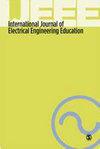Student acceptance of intelligent tutoring systems during COVID-19: The effect of political influence
Q2 Social Sciences
International Journal of Electrical Engineering Education
Pub Date : 2021-03-27
DOI:10.1177/00207209211003270
引用次数: 94
Abstract
Under the circumstance of COVID-19, online education has become an inevitable choice and a mainstream form of education in various countries Intelligent Tutoring Systems ( ITSs ) are a critical category of a carrier of online education which refers to using Artificial Intelligence Technology ( AIT ) to realize distance teaching and learning through integrating multiple resources, assist teachers to implement online classes and help students learn courses online, etc The target of this study is to examine the determinants that explain college students? adoption of ITSs based on TRA and TAM under the era of COVID-19 in China This study targets college students who have used ITSs over the previous year to learn courses In total, 590 valid samples were collected Partial least squares ( PLS ) approach is employed to inspect the determinants of college students? acceptance of using ITSs The results of the analysis indicate that perceived ease of use, perceived usefulness, subjective norm, college students? attitude and political influence significantly affect college students? behavioral intention towards using ITSs In addition, perceived usefulness, perceived ease of use, and political influence also affect college students? attitude toward using ITSs And consisitent with previous research, perceived ease of use has a significant effects on perceived usefulness This study enriches the TRA and TAM theories by incorporating a new variable political influence for researchers to consider in the future In addition, it makes several suggestions for system developers to improve system functions regarding its ease of use and for content manufactures to pay attention to quality regarding usefulness Recommendations are provided to colleges, universities and education authorities to rethink their roles in reforming online education through ITSs新冠肺炎期间学生对智能辅导系统的接受:政治影响的影响
在新冠肺炎疫情的背景下,在线教育已成为各国教育的必然选择和主流形式,协助教师实施在线课程和帮助学生在线学习课程等。本研究的目的是检验解释大学生的决定因素?新冠肺炎时代基于TRA和TAM的ITS在中国的采用本研究针对在过去一年中使用ITS学习课程的大学生。总共收集了590个有效样本。采用偏最小二乘法(PLS)来检验大学生的决定因素?ITSs使用的接受度分析结果表明,大学生的易用性、有用性、主观规范?态度和政治影响显著影响大学生?使用信息技术的行为意向此外,感知有用性、感知易用性和政治影响力也会影响大学生?对使用ITS的态度与以往的研究一致,感知易用性对感知有用性有显著影响。本研究通过引入一种新的可变政治影响,丰富了TRA和TAM理论,供研究人员在未来考虑。此外,它为系统开发人员提供了一些建议,以提高系统的易用性,并为内容制造商提供了一些关注有用性的质量的建议。建议各学院、大学和教育当局重新思考他们在通过信息技术改革在线教育中的作用
本文章由计算机程序翻译,如有差异,请以英文原文为准。
求助全文
约1分钟内获得全文
求助全文
来源期刊
CiteScore
2.90
自引率
0.00%
发文量
0
审稿时长
>12 weeks
期刊介绍:
The International Journal of Electrical Engineering Education''s origins date back to 1948, when the world’s first stored-programme digital computer ran at the University of Manchester. In 1963, the Bulletin of Electrical Engineering Education evolved into the International Journal of Electrical Engineering Education (IJEEE).

 求助内容:
求助内容: 应助结果提醒方式:
应助结果提醒方式:


